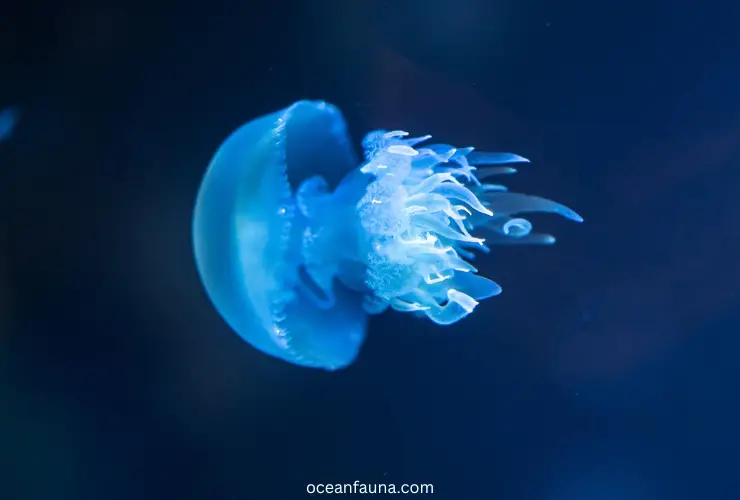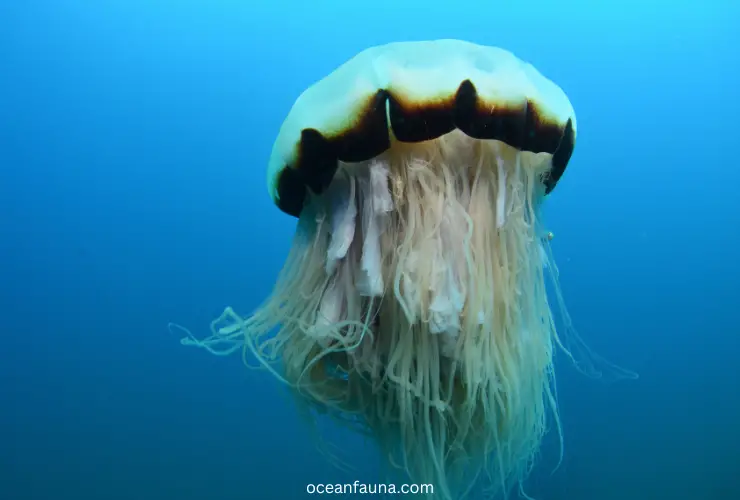Jellyfish cannot feel emotions in the same way that humans do. They lack a brain and a centralized nervous system. While it is true that jellyfish have a simple nervous system that allows them to sense their environment, this network of neurons is not complex enough to process emotional experiences or sensations of pain.
That being said, jellyfish are still fascinating creatures with many unique adaptations that allow them to survive and thrive in the ocean. They spend a significant portion of their life as free-swimming creatures in the Ocean. Also, they are known to pass some segments of their time as motionless polyps to the sea bed.
They have tentacles for preying on needs, but can they actually have feelings? In this blog, we will explore scientific research on whether jellyfish have feelings. Let’s talk about the behaviors and biology of these unique creatures.
Do Jellyfish Have Emotions?

Jellyfish do not have the same neural architecture or complexity as animals with more advanced nervous systems, such as vertebrates. Therefore, it is believed that jellyfish do not have the capacity for emotions like humans and other animals with more advanced nervous systems do.
Emotions are complex mental states that are thought to be associated with higher cognitive functions, such as memory, attention, and consciousness. These functions are not typically associated with jellyfish, as they lack a centralized brain.
Jellyfish do exhibit certain behaviors in response to stimuli, such as moving towards food or away from predators. These behaviors are thought to be reflexive rather than the result of conscious decision-making or emotional responses.
Do Jellyfish Feel Love?
Jellyfish are very simple organisms that do not have the cognitive ability to experience love or feel like humans and other more complex animals do.
Furthermore, jellyfish do not have the same hormones and neurotransmitters associated with feelings of love or affection. While they respond to their environment and exhibit certain behaviors, they are unlikely to experience love or other complex emotions like fear, happiness, or sadness.
Can Jellyfish Feel Pain Even If They Have No Brain?
Jellyfish do not have pain receptors like mammals and other more complex animals. Therefore, they cannot perceive pain as we do.
Pain is a subjective experience that requires the brain to interpret signals from specialized sensory neurons.
When poked, they will recoil due to a simple stimulus-response event, but they will not feel pain like humans. They have a primitive nervous system like other primitive animals, which serves as sensory organs that detect touch. However, their reactions are just instincts and not directed by endorphins.
Do Jellyfish Like Being Petted?

Jellyfish cannot feel the touch of a human hand, and they do not know that they are being petted.
Keep in mind that jellyfish are not typical pets. They don’t require the same level of care and attention as other animals, such as dogs or cats.
Studies suggest that jellyfish are happy if they have a clean tank with proper filtration. They are not fed, walked, or played with like other pets.
What Part of a Jellyfish Can You Touch?
Jellyfish have tentacles armed with tiny stinging cells called cnidocytes. For this reason, you should not touch the tentacles to prevent getting stung.
However, if you want to touch a jellyfish, you can touch the top of the jellyfish, where tentacles are not present.
Also, touching a dead jellyfish can cause a sting. That is because the stinging cells in their tentacles remain active after the jellyfish has died or been removed from the water. Therefore, it is best to avoid touching jellyfish altogether.
What Happens If a Jellyfish Touches You?

The tentacles of jellyfish have venom that can cause a reaction in humans upon contact. You may experience slight pain, itching, burning, or throbbing if a jellyfish stings you. The sting may also look like a rash with red, purple, or brown patches.
Sometimes, the sting can cause more severe systemic illness, including nausea, vomiting, headache, muscle pain, and difficulty breathing.
FAQs
Can we train a jellyfish to be friendly?
It is not possible to train jellyfish to be friendly as they lack emotions, feelings, and instincts. They do not have the capacity to learn behaviors or form attachments with humans.
However, with the proper care and environment, jellyfish can be kept as pets and provide a unique visual experience. It is important to note that keeping jellyfish in captivity requires expert knowledge and experience and should not be taken lightly.
Do jellyfish like or dislike humans?
Jellyfish do not have the capability to like or dislike humans since they do not possess a brain that can create emotions or thoughts. Therefore, it is incorrect to assume that jellyfish have any sort of preference toward humans. In fact, jellyfish stings are a common problem for people swimming or diving in oceans.
Conclusion
So, to sum up, jellyfish cannot experience pain, as they lack pain receptors and a central nervous system. They mostly rely on instincts to survive and interact with their environment.
Although they do not feel love or emotions, beachgoers often fear jellyfish because of their sting. Some jellyfish belong to more powerful venom than others.
Beyond their interaction with humans, jellyfish can unintentionally cause problems for us as well. They can get caught in commercial fishing nets, which can be a nuisance for fishermen.
Some species of jellyfish can also clog intake pipes of coastal power and desalination plants, which can be costly to repair and maintain.

